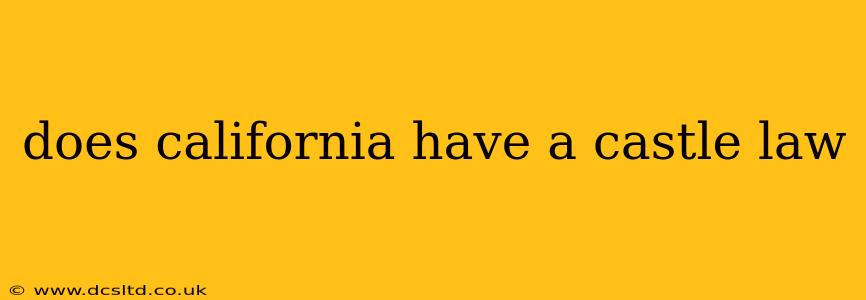California does have a form of "castle doctrine," although it's not explicitly called a "Castle Law" and its application is more nuanced than in some other states. The concept, however, is fundamentally the same: it allows individuals to use deadly force in self-defense within their own homes under certain circumstances. However, the specifics of how California law approaches this are crucial to understand.
This article will delve into the details of California's self-defense laws, clarifying what constitutes justifiable homicide under the "castle doctrine" and addressing common misconceptions. We'll also explore related questions often asked about self-defense in California.
What is California's "Castle Doctrine"?
In essence, California Penal Code Section 197, along with other relevant sections, establishes the legal framework for self-defense, including the right to use deadly force within one's home. It doesn't grant an absolute right to kill anyone who enters your property, though. The law requires a reasonable belief that deadly force is necessary to prevent imminent death or great bodily injury to oneself or another.
Key Differences from Other "Castle Laws": Unlike some states with more expansive Castle Laws, California's self-defense laws emphasize the necessity of a reasonable belief. This means the situation must genuinely present a threat to life or serious injury. Simply having someone enter your home uninvited does not automatically justify the use of deadly force. The burden of proof lies on the individual claiming self-defense to demonstrate this reasonable belief.
What constitutes "reasonable belief" in California self-defense law?
The "reasonable belief" standard is central to California's self-defense law. It considers what a reasonable person in the same situation would believe, taking into account the circumstances, including the perceived threat, the individual's prior experiences, and any available means of escape. A jury will ultimately determine whether the belief was reasonable. Factors considered might include:
- The size and strength of the intruder(s).
- Whether the intruder(s) possessed weapons.
- The intruder's actions and demeanor.
- Whether the individual had a reasonable opportunity to retreat. (While the "duty to retreat" is generally not required within one's home, this could be a factor in determining reasonableness.)
- Prior threats or history of violence with the intruder.
Does California's self-defense law extend beyond the home?
While the "castle doctrine" primarily focuses on the home, California's self-defense laws also apply outside the home. However, the "duty to retreat" before using deadly force generally applies in public spaces unless it would be unsafe to do so. Within the home, the duty to retreat is generally not required. This is a critical distinction.
What if I mistakenly use deadly force in self-defense?
Even if you genuinely believe you are in imminent danger, if your belief is deemed unreasonable by a court, you could face criminal charges. This highlights the importance of consulting with an attorney immediately after any incident involving self-defense. The legal ramifications are complex and depend on the specific facts of the case.
Can I use deadly force to protect my property in California?
No. California law does not allow the use of deadly force solely to protect property. Deadly force is only justified when there's a reasonable belief it's necessary to prevent imminent death or great bodily injury to oneself or another.
What are the consequences if I use deadly force in self-defense?
Even if the use of deadly force is deemed justifiable, there can still be significant consequences. A thorough investigation will be conducted, and you may face civil lawsuits regardless of the criminal outcome. This underscores the need for careful consideration and legal counsel.
This information is for educational purposes only and should not be considered legal advice. Always consult with a qualified legal professional for guidance on specific situations.
